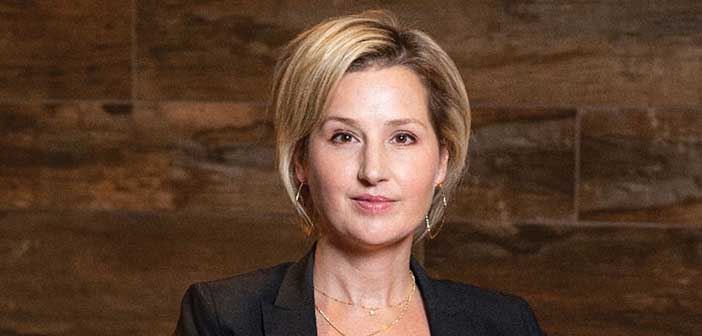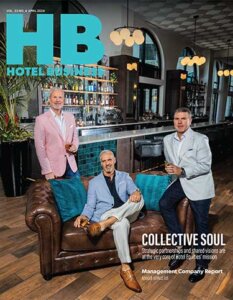As the hotel industry continues on the (mostly) positive path for 2024, management companies continue on their missions to offer the best experiences for guests—and profit for their owners. Hotel Business reached out to Rachel Moniz, COO, HEI Hotels & Resorts; Charles E. Oswald, president/CEO, Aperture Hotels; Micajah Sturdivant, CEO, MMI Hotel Group; Rick Takach, chairman/CEO, Vesta Hospitality; and Bryan Tubaugh, founder/ CEO, Aligned Hospitality Management, to get their takes on the industry’s performance this year, the labor issue and more.
—Gregg Wallis
How do you think 2024 has been so far for the hotel industry?
Moniz: The industry continues to stabilize as growth in the travel segment of the economy outpaces the growth of the overall economy. However, Costar consolidated data for primary markets initially projected 7% year-over-year (YOY) growth projections, and those figures are not materializing today. Most recent updates from the major REITs reported 2.5%-4.5% growth YOY. So, while there is growth, it is slightly more muted than expected.
Oswald: We’re seeing the unlevered rate of return (IRR) continuing to improve, but the cost of capital remains a challenge for many investors. Transactions are just starting to accelerate, and there has been an unprecedented amount of management company churn as owners search for better results.
Sturdivant: We have been pleasantly surprised as travel has continued despite macro demand analysts suggesting otherwise. As a Southeast U.S.-centric organization, we have probably seen more impact from weather patterns in the first quarter of 2024 than economic sentiment. We can’t control either but are encouraged that our team has been responsive to the market.
Takach: We are off to a good start. We set reasonable revenue budgets for the year and, as a result, our portfolio as a whole is hitting targets. We did experience some weather-related challenges on the Oregon coast that we will look to make up for as the year progresses. Through February, the industry as a whole was slightly down in occupancy and slightly up in revenues, with a net increase in RevPAR of 1% to 1.5%, which was expected.
Tubaugh: We’re seeing more and more owners hold their operators accountable. Unlike in the past, they’re willing to change operators if they’re still waiting for results, especially if an operator comes recommended. Numerous opportunities exist for third-party operators who are attentive to the concerns of owners seeking change. The key is to be prepared and eager to step in when needed. 2024 has also challenged operators to be more flexible in their models, and the good operators are able to pivot and continue to provide value for their owners and guests.
Finding and retaining good workers has been a challenge. How have you tackled this issue?
Moniz: I don’t think finding good workers is a challenge for HEI today. I have always discouraged my team from leaning on phrases such as “the market here is tough” when talking about their respective hotel portfolios because it does little to help solve the issue. We are a solutions-based firm, and we had the foresight to ramp up our Corporate Talent Acquisition team in 2021, so we have several recruitment experts dedicated to finding team members for our hotels.
We are now looking in new places for talent and, in some cases, reignited programs such as international workers to fill open positions, particularly because seasonality is synonymous with challenges, even in urban locations. As a result, we have found new ways to expand and contract the staff to coincide with the demand.
Most importantly, our company is a people-first culture, and our GMs are hyper-focused on taking care of our team members, celebrating with them, promoting from within and caring for them so they can take care of their families. These are all elements that have always been important in this industry. Under our HEI LOVES program, we have collected hundreds of core and soft benefits for our team members to access. These offerings serve as an investment we will always make, and I believe expanding access to benefits is a factor when prospective associates are making their choice.
Oswald: There are 2.5 million more job openings than unemployed individuals in the U.S. This means hospitality operators must be better than ever at identifying and hiring the right candidates. Aperture Hotels is focused on a five-point strategy:
1. Cast a broad net with a narrow funnel: Aperture Hotels is using single-source job distribution technology to broadcast our openings to more candidates. We then use AI technology to improve job candidate matching and for pre-screening so that our managers receive a smaller pool of better matched candidates who are most likely to succeed in the job role.
2. Flexibility & adaptability: Explore varied shift options such as four-hour shifts, four-day weeks with 10-hour shifts and irregular shift timings providing room for adaptability. We’re also testing remote and hybrid work models in limited situations. Additionally, we have introduced a mobile app allowing employees to select available shifts, giving them more control over their work schedules. While occasional use of contract labor can help us temporarily adapt to short-term demand spikes, our focus remains on nurturing our own employees.
3. Culture and engagement: Create a positive work environment around a clear set of values and priorities is crucial to employee engagement. We focus on building a customer-centric culture where every team member feels valued and part of the Aperture Hotels family.
4. Skills and career development: Recognize the importance of personal and professional growth, we offer development paths and systems of learning management. These initiatives encourage personal development and help build a strong bench of future leaders.
5. Employee well-being: We prioritize the well-being of our staff, understanding that a healthy and happy team is fundamental to delivering exceptional service.
Sturdivant: The gap between our youngest and oldest team members is more than 65 years. Communication matters to both, but the “what, where, why and when” are best when tailored to different audiences. Fortunately, we have been able to differentiate ourselves in the market through repeated, clear messaging.
Also, we welcome feedback, and, more importantly, we care and act on the insight of those throughout our organizational chart. We see the benefit of these actions in our team member engagement surveys.
Takach: Actually, things have stabilized quite a bit. We are not having the same degree of difficulty in finding people as we did right after the pandemic, and, overall, we are not seeing the same push for huge wage increases that we have over the last couple of years. Labor challenges do remain, however, and vary by market. In markets where there continue to be challenges, we adjust to circumstances by filling some positions with contract labor. It’s not an ideal situation, but we make it work by having good managers in place. Also, hospitality added the most jobs in 2023 of any economic sector, which reflects continued strength in our industry.
Tubaugh: Retaining team members is one of Aligned’s top priorities. Finding the right fit for a role takes time, hence our commitment to retaining our team members through every means available. We do this in various ways, but, most importantly, we show appreciation for them. For instance, we regularly recognize team members during scheduled meetings for their accomplishments; provide the necessary resources for growth through a range of training opportunities; and encourage team members to provide input to ensure we deliver the resources required to meet their objectives. Being a people-first organization, we’re always exploring new ways to keep our team members feeling valued, engaged and inspired. We also believe in retaining and training—not replacing. We believe that if we give the time and attention to our team members that we will see the growth in them personally and for our company.
Beyond labor, what are some of the other challenges you are facing?
Moniz: It is always challenging to temper optimism when forecasting, but our industry must face reality this year. Accuracy is a must, and a conservative approach may be necessary in the near-term to make strategic pricing decisions and stay smart when addressing expenses.
Oswald: 2024 U.S. topline forecast growth is projected at or below CPI. CPI and rising labor cost leads to margin pressure. Operators must be better than ever at expense management.
Softening average length of stay but improved lead time. U.S. national 1.8 length of stay is down 4% vs. the same time last year. This is happening just as new extended-stay brands are being launched and the segment is quickly trending toward oversaturation.
Insurance has doubled or even tripled in several major markets like Florida and California. Costs can be reduced by working with a management company that has geographic dispersion and low claims experience.
Financing. Interest rates have been higher for longer, causing debt service for many hotels to double over the course of these last couple years, and adding much stress (though not much distress).
Renovations are overdue at many hotels. Tough credit markets, depleted FF&E reserves and capital reserves locked up by lenders have led to many property improvement plans (PIPs) being excessively deferred. The major brands are eager to get these PIPs complete.
Uneven recovery: Houston market is performing very well, while San Francisco has the lowest GOP.
Sturdivant: Scale is one. Our industry is evolving with the big guys only getting bigger. The result can create an imbalance in responsibilities and rights. The franchisors, national management companies and institutional investors are understandably growing, but the frontline team member remains our most precious asset.
Takach: No surprise here, the costs for both goods and services remain difficult issues. The supply chain is still experiencing hiccups, both in getting needed items and the reliability of deliveries when we can source them.
Tubaugh: I want to point to another challenge besides labor, but we’re in growth mode. While we’re facing challenges hiring team members at the property level like everyone else, we’re also rapidly growing our portfolio, which means we’re also focusing on adding positions at the corporate level. For instance, we recently onboarded our first-ever COO to help us manage and handle the company’s daily business operations.
What do you expect for the rest of the year?
Moniz: This is looking to be a growth year for us. Since we are coming off a positive leisure year, we anticipate leisure travel will remain high, but new business will be minimal. However, we do anticipate group travel will continue to build steam throughout the years, particularly among upper-upscale properties. Business travel is still experiencing incremental growth, with these travelers seeking out premium brands and experiences. While we are holding ourselves back from embracing too much optimism, HEI benefits from all of these trends, and as such we are watching new developments to best position our properties for success.
Oswald: The gap between buyer and seller price expectations continues to close at a discount to replacement cost that cannot be ignored, while new construction remains a challenge. The pace of transactions will accelerate due to maturing debt, overdue renovations, lowering interest rates, modest supply growth and improving IRR. Major players like Blackstone and Brookfield have stated hotel acquisition targets of $1.5 billion to $5 billion for 2024. We’re going to see a lot of activity in the back half of 2024 and early 2025.
Sturdivant: After attending The Hunter Conference, I anticipate an increase in “activity”—however you might define that. With the new-construction funnel not being filled, a lot of players in the industry will be turning their attention elsewhere and looking to make changes whether that is in who is overseeing their investments, what they own, who their lending partner may be, etc. It’s going to be a busy time for those who have prepared appropriate to ride the wave. We at MMI are excited about what is to come.
Takach: We are optimistic. Our advanced bookings look good, and if our summers are strong, we should hit our budgets this year as a portfolio.
Group travel is back to 2019 levels and surveys of meeting planners reveal that business travel is expected to expand going forward. Another boost for select markets would be increases in inbound international traffic. It remains to be seen whether we witness that always anticipated election year boost to the economy.
From an acquisition standpoint, we are looking for interest rates to come down a little. If they do, and with so many loans facing maturity, there will be opportunities to acquire properties as buy and sell expectations become better aligned. A big part of this equation is how much pressure ownership faces to refinance debt or implement PIPs. There are a lot of properties hitting the market right now, but it is not at distressed pricing.
Tubaugh: We’ve been growing rapidly over the past couple of years, and we aim to hit our goal of 50 properties over the next several years. To accomplish this, we plan on expanding our portfolio in Arizona, Colorado and California, while also looking for opportunities in states near our support team, including Texas, Nevada and Washington. We have ensured that clients and team members share in our vision of expansion and collaboration, and we remain committed to maintaining this alignment.






